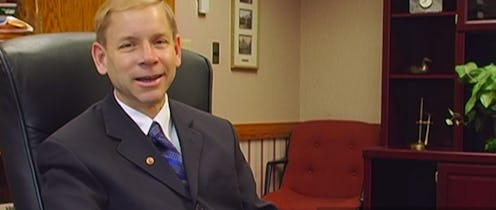
Making A Murderer is full of details from both the defense and the prosecution that make the case so confusing, and also very compelling. Fans of the series, having only ten hours of an incredibly long process to work with, formed their own opinions about some of the people involved, and have saved some of their harshest words for Len Kachinsky, Brendan Dassey's appointed attorney. Many fans are wondering what happened to Kachinsky after the Dassey appeal, and it appears that Len Kachinsky may still be practicing law.
In fact, Kachinsky was a member of Sisson & Kachinsky Law Offices in Wisconsin, however his status as an active lawyer with that firm has recently become less clear. The law office's website now reads "Law Office of Robert J. Sisson" and makes no mention of Kachinsky. However as recently as Dec. 15, a few days before Making A Murderer was released, Kachinsky was listed as a co-partner at the firm.
In the documentary, Kachinsky stated that his client, Dassey, "was heavily influenced by someone that could only be described as something close to evil incarnate," making reference to Dassey's confession, which stated that his uncle Stephen Avery encouraged Dassey to harm Teresa Halbach. (Dassey later denied that this confession is true, as seen in the documentary.) Kachinsky also allowed Dassey to be interrogated without a lawyer present, as seen in the documentary. Later, in 2013, the basis for Dassey's appeal was the claim that Kachinsky did not provide proper representation as Dassey's appointed lawyer. Kachinsky denied this claim and the court passed down the decision that "Dassey draws no viable link between Kachinsky’s actions and any demonstrable detriment to him."
In response to his portrayal in the documentary, Kachinsky released the following statement via Facebook in December. It is an excerpt of the decision handed down in Dassey's appeal case in January 2013:
See Court of Appeals decision of January 30, 2013 posted on our Facebook which states:
The decision of the Court of Appeals on January 30, 2013 in Case No. 10 AP 1305 included the following remarks:
¶11 Dassey draws no viable link between Kachinsky’s actions and any demonstrable detriment to him. While Dassey contends that at least as of April 23, 2006, Kachinsky and O’Kelly began planning to gather evidence favorable to the State and to extract a confession from him against his will, he identifies no
“adverse effect” at the May 4 suppression hearing. Kachinsky testified at the Machner hearing that he hoped to get the best deal he could for Dassey and that,knowing Dassey’s family was pressuring him, he mentioned the possibility of a plea to the media to “send a message” to them that Dassey might have to “take a legal option that they don’t like.” He also concluded that Dassey was properly Mirandized before the March 1 questioning; the trial court agreed and successor counsel likewise saw no meritorious Miranda issue. ....
¶13 Kachinsky was long gone before Dassey’s trial or sentencing.
Dassey has not convinced us that Kachinsky’s actions amounted to an actual conflict and that Kachinsky’s advocacy was adversely affected, such that it was detrimental to Dassey’s interests. He is not entitled to a new trial or hearing.
Dassey has not convinced us that Kachinsky’s actions amounted to an actual conflict and that Kachinsky’s advocacy was adversely affected, such that it was detrimental to Dassey’s interests. He is not entitled to a new trial or hearing.
Kachinsky's recently deleted bio on the law office's page is available via web archive and states that Kachinsky "take[s] seriously 'innocent until proven guilty.'"
Image: Netflix